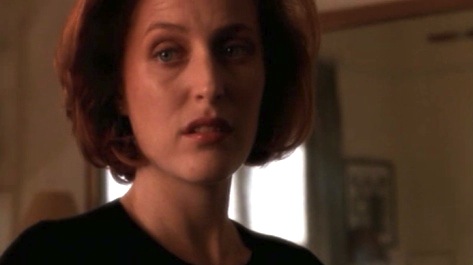Season 8, Episode 13: “Per Manum”
Original Airdate: February 18, 2001
What if Scully had always been the believer? What if, and I mean, really what-if, and I mean, what I’m really talking about here is gender. Is about what it’s always meant to this show to have a female skeptic and a male believer, and how that’s changed now that Mulder is gone and Scully believes and Doggett is Doggett. “Per Manum” returns us to one of the show’s classic mytharcs—the eternal mystery of Scully’s womb—and as it does so, with these roles reversed, the division between the new show and the old show appears more startling than ever.
Scully is what you might call a Strong Female Character. She’s smart, she’s clever, she thinks for herself, she mostly has autonomy. I say mostly, because the X-Files were Mulder’s scene, and because she never really believed—at least not while he was around—most episodes were structured around his forward-motion and her cautious-following. As played by Gillian Anderson, you’d almost never accuse Scully of being a follower, but given what she was given to play, the fact is that Scully was always, secretly, a bit dependent.
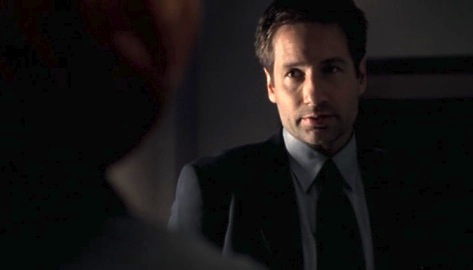
And then there’s the matter of her abduction, and her cancer, and her subsequent inability to conceive. Which you could also read as: the matter of the price she paid for committing herself to another man’s quest. A quest that was only occasionally made hers, only when the story supported it. (How frustrating it was, to watch her briefly believe in a mytharc, only to repeat the same nonbeliever lines the second a monster-of-the-week reared its head.) Whether Scully suffered more than Mulder is perhaps debatable; whether her suffering was more intimate was, until the reveal of Mulder’s somewhat-retconned approaching-death, not.
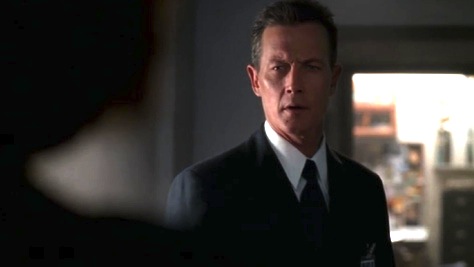
Furthermore, while it may have appeared that the character of Dana Scully was a progressive one—Strong! Female! Character!—the core signifiers of her character were negated notions of femininity. She wore pantsuits (not dresses) and believed in hard evidence (not intuition). And while there’s certainly a female character out there who could contain all these multitudes, there were telltale signs that Scully’s hard-nosed character was a veneer, not a personality. Consider that when she cracked, she cracked along the most traditionally feminine line: motherhood. Recall “Christmas Carol”/“Emily,” the way she fought to adopt a child. How she told her own mother that motherhood wasn’t something she wanted, until she realized she couldn’t have it.
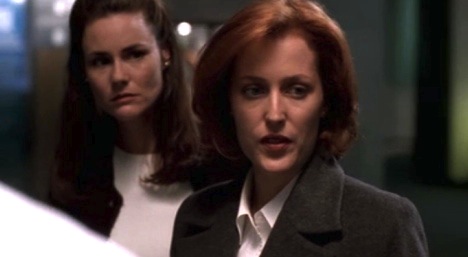
The reveal of Scully’s pregnancy at the end of season 7 was a neat trick, but also, a potentially troubling one (not to mention a particularly soap-y one). Her transition towards Belief was accompanied by twin harbingers of traditional femininity. Motherhood, number one. And being left behind, number two. When Scully was abducted, Mulder was on his own for an episode and a half. Now that Mulder’s been abducted, she’s on her own until who-knows-when. And because the show’s structure hasn’t been permanently altered—because the entire season has not been written as the quest of two people to find a third—Scully is in many ways holding down the homefront, a candle (or X?) lit in the window.
This is not necessarily a criticism. In fact, I find Believer-Scully to be incredibly interesting. She’s still clever and tough, but now she’s allowed emotions. And she’s allowed emotions all the time, not just when the writers remember she might have some. “Per Manum” is one of the most emotional Scully-centric episodes the show has ever given us. A man named Haskell approaches Scully and Doggett and tells him that his wife, a multiple abductee, gave birth to an alien baby and was murdered by her doctors. Doggett—without knowing about Scully’s pregnancy—notes that Mrs. Haskell’s story is similar to Scully’s (abduction, cancer, inability to conceive). Scully dismisses the notion to his face, but secretly investigates.
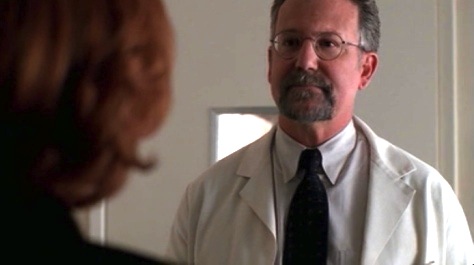
Her doctor, it turns out, works for the same genetics company as Mrs. Haskell’s doctor; her most recent sonogram appears to be similar to one that Mrs. Haskell had. The evidence mounts and Scully grows more fearful, the believer in her now willing to entertain the notion that her pregnancy may not be 100% human. Credence to this theory is offered to us in flashback, as we learn that at some point, Scully’s doctor informed her that she might be able to conceive with the help of a sperm donor. And: she asked Mulder. And: he said yes. And: it didn’t take? But then they embraced, and maybe something else happened between them or maybe it didn’t?
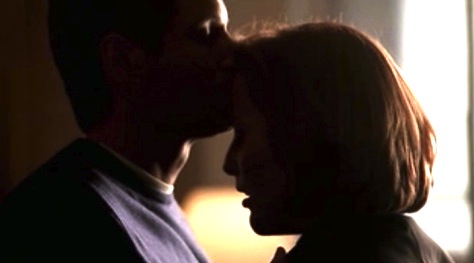
Point being, plenty of grey area. Point being, who can even trust doctors anymore! And here’s the strength of letting Scully be a lady, of telling a woman’s story. She’s approached by another patient of the genetics clinic, a pregnant woman looking for protection. Scully takes her to another hospital, then begins to suspect that the doctors there aren’t on the level, either. Two pregnant women, running, unable to rely on the professionals in whom they must, must, must rely. Mutants, fine, aliens, okay, but shady OB/GYNs? More likely to give me nightmares than anything the show has thus far covered.
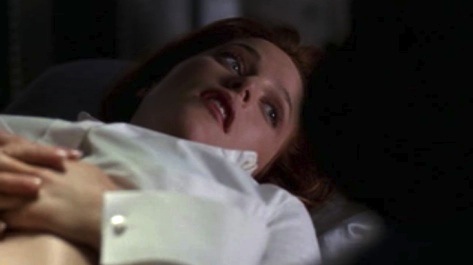
A series of events, and Scully wakes up in a hospital, her nonbeliever-partner gently telling her that she overreacted, that the woman who asked for her help gave birth to a perfectly healthy human baby, that nothing was ever wrong. It’s nothing that Mulder and Scully didn’t hear for years, but with Scully’s pregnancy on the line, it seems to cut particularly deeply. This is what the X-Files would have been, had Scully been the believer: a woman being told that she is hysterical, a woman being told that she imagined it all. A woman being told that the evidence of her own body is invalid.
Meghan Deans wants a second opinion. She Tumbls and is @meghandrrns.










